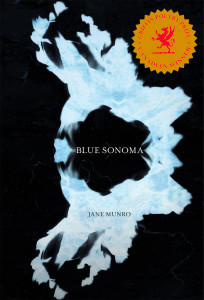RUSTY TALK WITH JANE MUNRO Jane Munro Jane Munro JANE MUNRO'S sixth poetry collection is Blue Sonoma (Brick Books, 2014), winner of the 2015 Griffin Poetry Prize. Her previous books include Active Pass (Pedlar Press, 2010), Point No Point (McClelland & Stewart, 2006) and Grief Notes & Animal Dreams (Brick Books, 1995). Her work has also received the Bliss Carman Poetry Award, the Macmillan Prize for Poetry, been nominated for the Pat Lowther Award, and is included in The Best Canadian Poetry 2013. She is a member of the collaborative group Yoko’s Dogs whose first book, Whisk, was published by Pedlar Press in 2013. She lives in Vancouver.
Catherine Graham: Congratulations on winning the Griffin Canadian Poetry Prize 2015 for your sixth collection, Blue Sonoma, described by your publisher, Brick Books, as “a wise and embodied collection of dreamscapes, sutras and prayer poems from a writer at her peak.” Was there a moment when you realized you were a poet or was it something that just built up over time? Jane Munro: That’s a good question. I remember feeling it was hard to justify spending time on poetry—instead of doing something obviously useful—when there was no external evidence that I was a poet. As a young mother with three children, I'd go so far as to ask myself, if I weren't me but a young male poet deciding whether to hire a babysitter so he could work on poetry or save his money and spend time with his kids, or some other such choice I found difficult, would I know what to do? I’d know. It wasn’t always the same answer, but when I called myself a poet and took being a woman out of the equation, I’d know what it was best to do. Even after I’d published books, being a poet felt different from being someone who composed poetry. I juggled writing time with time for family, earning a living, studying. Did real poets live the kind of life I was living? At some point, I stopped worrying about whether or not I was a poet. Perhaps the turning point came when I figured out that my best contribution to the welfare of the whole was to be myself – liver cells didn’t help the body by trying to be bone cells (not that they had such a choice) – and that being oneself wasn’t “selfish” (my mother’s accusation about artists). It also helped to grasp that even DNA is flaky: mathematicians could devise a stronger code. CG: The first of four sections, “Darkling,” is a sequence of poems numbered one to twelve that seems to counteract a husband’s descent into Alzheimer’s by celebrating the physicality of life with its vivid, precise and sensual imagery: “the glans of a penis, smooth as an acorn,” “The stone that made me think of a full soul / smooth and heavy in my hand,” “A candle guttering.” In the second Darkling, the defiant line “Peeling the grape of death” appears. Your poems are like peeled grapes, more flesh is revealed as one reads them through. Can you tell us about the origin and development of this book? JM: In a crisis, sealing off vulnerable parts may allow you to do what’s essential. But when it’s not exactly a crisis, even though your reality is a slowly aggregating disaster (such as dementia or what’s happening with climate change), locking yourself into coping mode (being hide-bound) isn’t synonymous with self-protection. But it’s easy to get trapped in the pain of grief. When I started writing the poems in Blue Sonoma, I had classic responses to pain: anger, self-pity, helplessness, hopelessness. I was even afraid my own life was over. Making art took heart, mind, body and spirit. Working on the poems made me feel whole. There wasn’t any choice about vulnerability. Peeling the grape of death meant more flesh was revealed. Dementia became a metaphor; I began to see the time we’re living in through a lens of dementia. If the poems were to provide architecture for the imagination of others, they had to be inhabitable. I didn’t think of them as mine though they came through me and drew on my resources. That’s why I like doing readings: it’s my chance to sense the poem complete its transitive arc; feel others move into it, furnish it with personal stuff. I don’t know if this answers your question. I wasn’t in any rush to finish the book. CG: It does answer my question, thanks. In the section “Dream Poems,” dream-reality is reproduced through stark and stirring imagery. These poems are often laced with a post-dream realization such as the last line from “The net of heaven is cast wide”: “He is not a person I knew in life.” Could you tell us more about your relationship with poetry and dreams? JM: In the iceberg of consciousness, the vaster realm floats beneath the surface of day-to-day thought. Sometimes, I feel that we all share an unconscious reservoir of imagery and story. While I was writing Blue Sonoma, I was recording dreams. This kept me in a conversation with images from the less-conscious parts of my mind. If I’m right that we share some of this material, then dream imagery might also connect with deeper layers of the reader’s consciousness. Not every dream comes from that level; some appear to simply recycle a day’s debris. The poems in the second section of the book are records—translations—of specific dreams. Many of the other poems in Blue Sonoma draw on dream imagery, or move as dreams move. Each of them was a mystery. During its gestation, I’d be curious to meet it. For some, that took a long time. CG: The spare and moving 11-part sequence “Old Man Vacanas” is cutting in its frankness and dark with black humour. The consistency of the voice addressing or observing “the old man’s” struggle with dementia links the poems into a cohesive monologue. How did this section come together for you? JM: The “Old Man Vacanas” are contemporary approximations of an ancient poetic tradition. In Kannada, a South Indian language, vacana means “saying; thing said.” Vacanas are colloquial prayer poems using natural and domestic imagery to voice—often, complain about—family, village, spiritual, and philosophical issues. Unlike poetry in Sanskrit, they aren’t aureate. The 12th Century vacanas were prayers addressed to Shiva—or, more precisely, to the poet’s personal deity (Mahadeviyakka calls on “my lord white as jasmine”). In “Old Man Vacanas” the “you” is not identified. I thought of the “you” as the listener. The poems in this sequence started coming during a snowstorm when we were cut off—the roads impassable. I wrote one after another. This doesn’t happen for me very often, not with that intensity: every time I sat down, another came. I liked them and kept them. Later, others came. I couldn’t tell how long the run would be so played around with it over the next five or six years. Eventually, “Old Man Vacanas” came down to the set of eleven in Blue Sonoma. It was an odd number. CG: What is the best piece of writing advice you’ve been given that you use? JM: Write as if you’re already dead. This advice is attributed to Nadine Gordimer, but it reminds me of Krishna’s injunction to Arjuna in the Bhagavad Gita: surrender the fruits of your actions. Yogis say we have the pleasure of doing our work but no control over its outcomes. That’s the thinking behind Karma Yoga (karma means action). Yoga practices end with Savasana—corpse pose—during which you let go everywhere, release what you did or didn’t do, drop body and mind into stillness and silence. It’s refreshing and energizing. CG: What were some of the highlights from your Griffin experience? JM: Oh, my! It was all extraordinary: reading to over 1000 people—Koerner Hall filled with poetry and their attention; meeting and listening to the other shortlisted poets; the generosity and sincerity of the Griffins: their love for poetry, their vision, their attention to every detail; meeting the illustrious Griffin Trustees and jurors, many of whom I hadn't met before; the recitation by Ayo Akinfenwa (finalist in Poetry in Voice) at the gala; the way everything left me feeling hope for poetry. And, of course, winning: my daughters and friends with me—even distant friends and family watching. A Griffin has wings. I was transported. CG: What advice would you give to an aspiring poet? JM: Read and write, read and write, then read some more. Relax; be present; be curious; pay close attention; be patient. CG: What’s next for Jane Munro? JM: Writing: settling into my own rhythms and practices and work. That’s the main thing. This fall, thanks to an apartment exchange, I’ll spend a month in Germany. I was in India for two months last fall studying yoga. It’s ages since I had much time in Europe.  = = Blue Sonoma Jane Munro Brick Books, 2014 Winner of the 2015 Griffin Poetry Prize A wise and embodied collection of dreamscapes, sutras and prayer poems from a writer at her peak In Blue Sonoma, award-winning poet Jane Munro draws on her well-honed talents to address what Eliot called “the gifts reserved for age.” A beloved partner’s crossing into Alzheimer’s is at the heart of this book, and his “battered blue Sonoma” is an evocation of numerous other crossings: between empirical reportage and meditative apprehension, dreaming and wakefulness, Eastern and Western poetic traditions. Rich in both pathos and sharp shards of insight, Munro’s wisdom here is deeply embedded, shot through with moments of wit and candour. In the tradition of Taoist poets like Wang Wei and Po-Chu-i, her sixth and best book opens a wide poetic space, and renders difficult conditions with the lightest of touches. Grey wood twisted tight within the framework of the tree – impossible to snap off, forged as it dries. And in me, parts I can’t imagine myself without – silvering. ~from “The live arbutus carries dead branches…” Praise for Jane Munro: “spellbinding … haunting … thoughtful, evocative … arresting images … Zen-like spirituality… ” ~The Toronto Star Excerpt from Blue Sonoma, Brick Books 2014 a woman trolling for halibut caught the moon. It was pale and pocked. It lengthened from disc to oval to flat fish as she lifted it. The rod bowed. When the rod’s tip touched the water’s surface the moon sprang from the wavesstreaming foam, and soared overhead. The woman fell on her back – winded, wordless – rocking as the boat rocked. The moon hung above her huge and closer than a star. It had grown on a tongue of silt at the river’s mouth, dark-side-down resting on its mind-reading side, then slid to deep waters. Staring up at it, the woman knew it knew. Catherine Graham is the author of Her Red Hair Rises with the Wings of Insects, a finalist for the Raymond Souster Poetry Award and the CAA Poetry Award. She won the International Festival of Authors’ Poetry NOW competition in 2014.
|
Rusty Talk
Rusty Talk Editor: Archives
November 2017
Categories
All
|

 RSS Feed
RSS Feed
